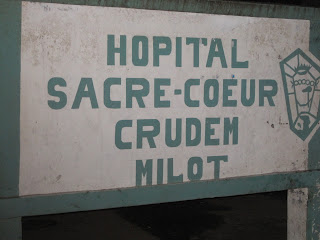

“Be of good cheer. Do not think of today's failures, but of the success that may come tomorrow. You have set yourselves a difficult task, but you will succeed if you persevere; and you will find a joy in overcoming obstacles. Remember, no effort that we make to attain something beautiful is ever lost.”
- Helen Keller
I’ve been traveling a fair amount lately, both in business and personal realms. Sitting in one place allows the luxury of time and contemplation. Some of my most creative thoughts and blogs have come while riding the train from New York, or watching the planes depart from the vantage point of the rocking chairs in the Charlotte airport. Physical travel is the metaphor for our own life journeys and with it, the contemplation of the future. The physical and symbolic transformation in going to Haiti was reinforced recently when I was on a plane listening to a blog Ben sent me.
http://www.thisamericanlife.org/radio-archives/episode/408/island-time
It speaks of the importance of some structure for future success in Haiti, and that money alone won’t solve, and may in fact worsen, the problem. There are also uplifting stories of self determination and the balance between providing help and creating dependency. In my mind it spoke both to optimizing the present and setting a course for the future.
These have been a difficult few years for many. Economic upheaval, job loss, environmental catastrophes, and personal struggles with change – it makes one wonder what the future will look like. But then I meet amazing people doing remarkable things. I’ve recently visited a patient centered clinic model that has blurred silos and truly aligned incentives for providers and hospitals; I’ve met a woman in her 50’s with a PhD in Child psychology– she works as a flight attendant weekends to supplement her income so she can do what she loves - treat disabled children, some with little if any insurance; I’ve watched parents with newborns and tight budgets still putting something away for college- and the belief in the future.
Helen Keller never planned to be blind, deaf, and mute. It is likely she has no memory of those senses. But her story, and the lessons it teaches us, transcend mourning current loss and instead focuses on the new opportunities of tomorrow.
So while we have concerns for the future of Haiti, and issues in our own lives and those around us, it is the future that keeps us toiling in the now. I have mentioned “The Right Stuff.” John Glenn, the first American to orbit the earth summed it up beautifully.
“People are afraid of the future, of the unknown. If a man faces up to it, and takes the dare of the future, he can have some control over his destiny. That's an exciting idea to me, better than waiting with everybody else to see what's going to happen.”
Let's raise a bottle of Prestige beer for the people of Haiti and for ourselves with a toast. "Anvi!" "To the future!"



















